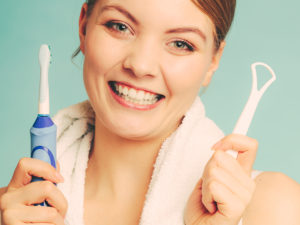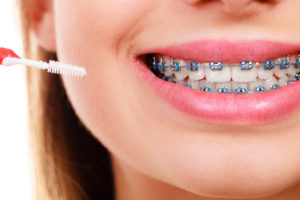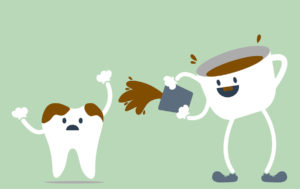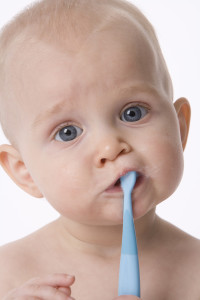By: Dr. Elizabeth Eggert
How to Handle SCARY and Dreaded Chronic Bad Breath
 Does the fear of halitosis keep you up at night? If so, you’re not alone. Millions of Americans suffer from chronic bad breath. But you don’t have to suffer through this waking nightmare. Fortunately, we know many of the causes of halitosis, so we can offer you ways to treat and prevent it.
Does the fear of halitosis keep you up at night? If so, you’re not alone. Millions of Americans suffer from chronic bad breath. But you don’t have to suffer through this waking nightmare. Fortunately, we know many of the causes of halitosis, so we can offer you ways to treat and prevent it.
What’s Causing Your Bad Breath
Halitosis is more than morning breath or lingering odor from a tuna salad sandwich. It’s caused by bacteria thriving in your mouth and sinuses. Cavities and gum disease give bacteria extra places to live and breed. Bacteria also love the mucus your body produces when you’re recovering from a cold. If you have dry mouth from medications, an illness, or alcohol, tobacco, and caffeine use, you’re also likely to experience halitosis. That’s because saliva washes away potential food for bacteria. Without saliva, bacteria thrives.
Chronic illnesses can also cause halitosis. Gastric reflux, liver disease, kidney disease, and diabetes can all cause chronic bad breath. So can smoking tobacco, which contributes to gum disease and dry mouth.
Handling Halitosis
Since you know what causes halitosis, you can take steps to treat and prevent it. If you use tobacco or drink alcohol and caffeine excessively, consider quitting. If you’re battling a cold or sinus infection, work to clear your nose and sinuses as well as brush your teeth regularly and use mouth wash for your comfort while you heal. And if you wear dentures, make sure to take them out at night and clean them well before popping them back in your mouth in the morning.
 If cavities or gum disease are causing your halitosis, it’s time to book a recare appointment with Eggert Family Dentistry. We can treat your cavities and diagnose and treat gum disease to keep bacteria at bay. Continue your care at home with regular brushing and flossing. Scraping your tongue with your tooth brush or a special tongue scraper can cut down on halitosis, too.
If cavities or gum disease are causing your halitosis, it’s time to book a recare appointment with Eggert Family Dentistry. We can treat your cavities and diagnose and treat gum disease to keep bacteria at bay. Continue your care at home with regular brushing and flossing. Scraping your tongue with your tooth brush or a special tongue scraper can cut down on halitosis, too.
You don’t have to be haunted by halitosis anymore. Schedule your recare appointment with us today to start treating your chronic bad breath.

 Use these miniature bottle brushes to tackle gaps or spaces between teeth, and to gently clean around and underneath your braces and wires where your brush isn’t making contact. Again, be systematic: start at one end and go all the way to the other, moving the brush between each set of brackets.
Use these miniature bottle brushes to tackle gaps or spaces between teeth, and to gently clean around and underneath your braces and wires where your brush isn’t making contact. Again, be systematic: start at one end and go all the way to the other, moving the brush between each set of brackets.
 8. Coffee
8. Coffee

 Tooth sensitivity is a common dental problem. At Eggert Family Dentistry, our patients often ask how to get rid of tooth sensitivity so they can start enjoying ice cream and coffee again. We’re happy to tell them that yes, tooth sensitivity can be treated. Often, diagnosing tooth sensitivity helps us uncover underlying oral health conditions that are also treatable.
Tooth sensitivity is a common dental problem. At Eggert Family Dentistry, our patients often ask how to get rid of tooth sensitivity so they can start enjoying ice cream and coffee again. We’re happy to tell them that yes, tooth sensitivity can be treated. Often, diagnosing tooth sensitivity helps us uncover underlying oral health conditions that are also treatable. Since the 1960s, communities across Minnesota and the United States have added fluoride to their community water supplies. Fluoridating water is an easy and cost-effective way to improve residents’ oral health. Though some consumers find the practice controversial, many
Since the 1960s, communities across Minnesota and the United States have added fluoride to their community water supplies. Fluoridating water is an easy and cost-effective way to improve residents’ oral health. Though some consumers find the practice controversial, many  Memorial Day weekend officially kicks off the summer cookout season in Minnesota. Many of us look forward to toasting grads, dads, and warmer weather with brats, cold pop, chips, and frozen treats to cool us off. But many of the cookout foods we look forward to in summer can wreak havoc on our teeth. Here are some tips on how to enjoy summer cookouts while maintaining a healthy smile.
Memorial Day weekend officially kicks off the summer cookout season in Minnesota. Many of us look forward to toasting grads, dads, and warmer weather with brats, cold pop, chips, and frozen treats to cool us off. But many of the cookout foods we look forward to in summer can wreak havoc on our teeth. Here are some tips on how to enjoy summer cookouts while maintaining a healthy smile.
 By: Dr. Elizabeth Eggert
By: Dr. Elizabeth Eggert